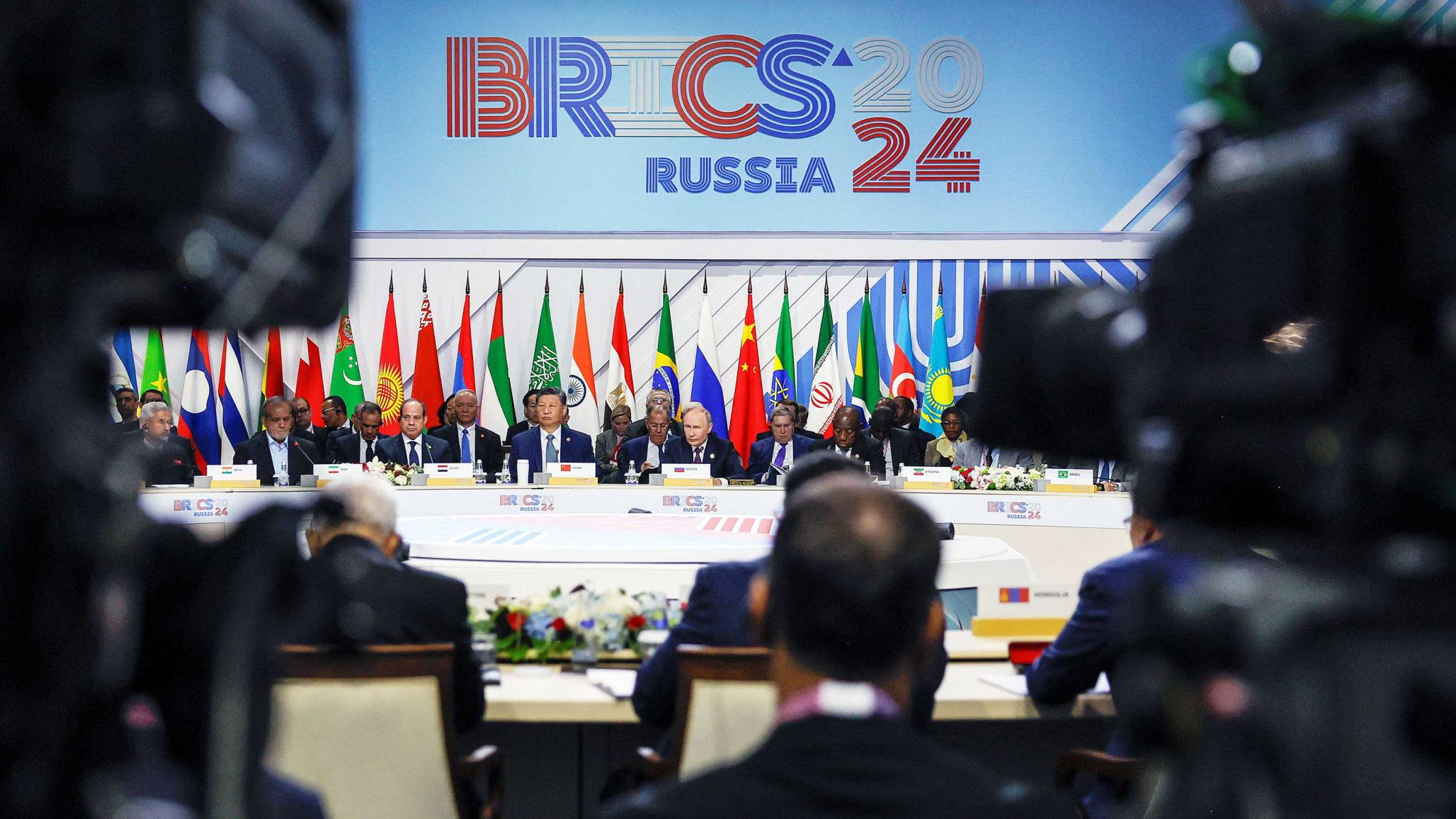While finance ministers and central bank governors from around the world rubbed shoulders in Washington, DC, in late October, Russian president Vladimir Putin was hosting another high-level meeting in Kazan, Russia—the BRICS Summit. Attended by leaders from China, India, and many other countries for a total of 36 countries represented, the gathering grandly demonstrated the failure of the West's effort to isolate Russia after its the invasion of Ukraine.
The summit reflected the BRICS countries' understandable concern about their lack of agency in the Western-dominated international governance and financial system. But the BRICS—made up of its eponymous members Brazil, Russia, India, China, and South Africa, plus newcomers Egypt, Ethiopia, the United Arab Emirates (UAE), and Iran—remains unable to coalesce around much besides those concerns in the abstract. It is plagued by members' misalignments on the group's identity and how much they want to distance the group from the "rules-based" order they criticize.
This inability to agree on an orientation has obstructed achieving stated economic goals, like creating payment and currency systems to avoid the dollar. Nevertheless, Western nations would be foolish to ignore the dissatisfaction with the status quo voiced in Kazan.
Building BRICS
The original BRICS—Brazil, Russia, India, China, and South Africa—has always been a peculiar grouping. The economies have little in common besides being "big." Brazil, Russia, India, and China were lumped together by Goldman Sachs in 2001 as potential emerging drivers of economic growth. The group evolved into a loose geopolitical bloc when it began holding annual summits with a rotating host in 2009 (adding South Africa in 2010).
At the 2023 Johannesburg Summit, the BRICS invited Egypt, Ethiopia, Iran, the United Arab Emirates, Argentina, and Saudi Arabia to join the group at the start of 2024. The first four did, while Argentina's newly-elected president Javier Milei withdrew earlier this year. Saudi Arabia is equivocating, neither accepting nor rejecting its invitation, participating in BRICS gatherings and meeting with Western officials at the same time.
Picking sides
What unites the BRICS is less a positive agenda of agreed-upon goals and more shared dissatisfaction with the Western-dominated rules-based international economic order. The relationships among members can be tense. For example, Egypt and Ethiopia have been locked in a dispute over the Grand Ethiopian Renaissance Dam on the Nile River for decades. Despite a deal on the Himalayan border and the first formal meeting in five years between China's president Xi Jinping and India's prime minister Narendra Modi, where they both said cooperation is positive for a multipolar world, many issues remain a source of conflict between them.
And a more fundamental tension remains.
For Russia and China, the motivation is a desire for something explicitly anti- or at least post-Western. Putin has called the West's rules-based international order "classic colonialism." Xi has long railed against Western hegemony, suggesting BRICS expansion could counterweigh the West's power. Adding Iran last year further illustrates the group's anti-Western bent.
For others, it's different. India, South Africa, and Brazil would rather reform the Western order from the inside, echoing many arguing the World Bank and International Monetary Fund are dominated by the United States and Europe. "BRICS is not a counterpoint to the G7, nor the G20, nor against anyone," Brazilian president Luiz Inácio Lula da Silva tweeted last year. The day after the 2024 BRICS Summit ended, the Reserve Bank of India's governor outlined priorities for the G20 and international financial institutions, not mentioning the BRICS once.
This fundamental tension between the anti-Western-institutions and reform-Western-institutions stances has limited the BRICS members' ability to articulate a raison d'etre.
What happens in Kazan…
These divisions have also limited what the BRICS can get done concretely. Much digital ink was spilled before the 2024 summit about a potential BRICS alternative payment and settlement system—Russia indicated it would feature heavily. Conducting commerce in something other than the dollar would enable Russia and Iran to escape globally coordinated economic sanctions that cut off their ability to transact with much of the world; China is looking to reduce its reliance on the dollar; Lula has long advocated for developing countries to conduct trade in their own currencies or shared non-dollar currencies; and India is increasingly transacting in rupees, including with fellow BRICS members Russia and the UAE.
But per the Kazan Declaration from the summit, no significant changes to or creation of payment structures will materialize anytime soon—the BRICS countries "agree[d] to discuss and study the feasibility of establishment of an independent cross-border settlement and depositary infrastructure" and tasked finance ministers and central bank governors (many were in Washington at the time) to "continue consideration" of local currencies and payment instruments. Putin said as much in a post-summit news conference. While the members agree in theory on the necessity of such a platform, they could not come to a consensus on what actually operationalizing it would look like.
BRICS watchers also expected another expansion. The Kazan Declaration did "endorse" "Modalities of BRICS Partner Country Category"—13 were added by consensus: Algeria, Belarus, Bolivia, Cuba, Indonesia, Kazakhstan, Malaysia, Nigeria, Thailand, Turkey (notably a NATO country), Uganda, Uzbekistan, and Vietnam—but does not elaborate what defines a "Partner Country." Further highlighting disagreements between members, Brazil reportedly blocked Venezuela's addition to the partner list despite Russia's support.
Yes, and…
The Kazan Declaration illustrates how BRICS members can agree in abstract but not on mechanisms and implementation. What this diverse group of countries have in common is that they want to be grouped together at all.
Even as it struggles to define its identity, it is unlikely the BRICS is the last iteration of a new geopolitical bloc. What the BRICS is right now is a symbol of what's next in international cooperation not led by the West.
Data Disclosure
This publication does not include a replication package.


